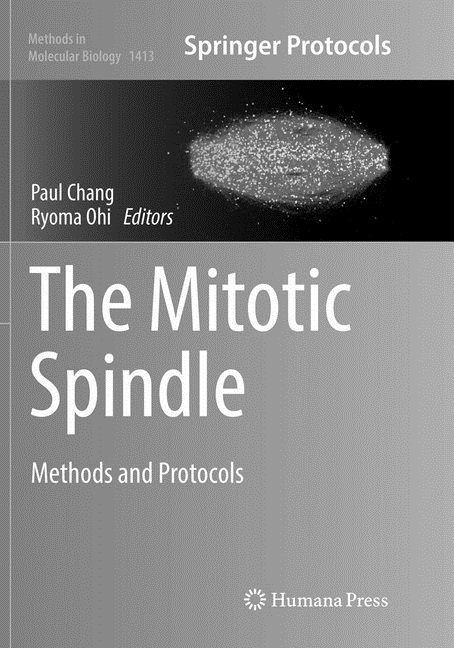Read more
This volume includes a series ofprotocols focused on mitotic spindle assembly and function. The methods coveredin this book feature a broad range of techniques from basic microscopy to thestudy of spindle physiologies relevant to cancer. These methods can be appliedto diverse model systems that range from the cell-free Xenopus eggextract system to the moss Physcomitrella patens, in an effort todemonstrate the key contributions made by researchers using multiple modelorganisms. Chapters in The Mitotic Spindle: Methods and Protocols integrate cutting-edge technologies that have only become available due to thecross-disciplinary efforts, such as ATP analogue sensitive inhibition ofmitotic kinases. Written in the highly successful Methods in Molecular Biologyseries format, chapters include introductions to their respective topics,lists of the necessary materials and reagents, step-by-step, readilyreproducible laboratory protocols, and tips ontroubleshooting and avoidingknown pitfalls.
Thorough and informative, TheMitotic Spindle: Methods and Protocols, is a valuable resource forresearchers who are new to mitosis or are already experts in the field.
List of contents
Using FluorescenceMicroscopy to Study Mitosis.- Using PhotoactivatableGFP to Study Microtubule Dynamics and Chromosome Segregation.- Purification and Fluorescent Labelingof Tubulin from Xenopus Laevis Egg Extracts.- Measuringthe Effects of Microtubule-Associated Proteins on Microtubule Dynamics In Vitro.- Imagingand Quantifying the Dynamics of Gamma-Tubulin at Microtubule Minus Ends in Mitotic Spindles.- Visualizing and Analyzing Branching Microtubule Nucleation Using Meiotic Xenopus Egg Extracts and TIRF Microscopy.- Encapsulationof Xenopus Egg and Embryo Extract SpindleAssembly Reactions in Synthetic Cell-Like Compartmentswith Tunable Size.- In Vitro Kinetochore Assembly.- Biochemicaland Structural Analysis of Kinetochore Histone-Fold Complexes.- Measuring Kinetochore-Microtubule Attachment Stability in Cultured Cells.- StudyingKinetochores In Vivo Using FLIM-FRET.- Purification of Fluorescently LabeledSaccharomyces Cerevisiae Spindle PoleBodies.- A Cell-FreeSystem for Real-Time Analyses of Centriole Disengagement and Centriole to CentrosomeConversion.- Assaysto Study Mitotic Centrosome and Spindle Pole Assembly and Regulation.- AnalyzingSpindle Positioning Dynamics in Cultured Cells.- Quantification of Mitotic Chromosome Alignment.- Imaging Mitosisin the Moss Physcomitrella Patens.- Small MoleculeApproach to Study the Function of Mitotic Kinesins.- Identificationand Characterization of Mitotic Spindle-Localized Transcripts.- Probing Mitosisby Manipulating the Interactions of Mitotic Regulator Proteins Using Rapamycin-InducibleDimerization.- StudyingKinetochore Kinases.- Engineeringand Functional Analysis of Mitotic Kinases through Chemical Genetics.- Using CellCulture Models of Centrosome Amplification to Study Centrosome Clustering in Cancer.- Generationand Purification of Tetraploid Cells.- Anti-MicrotubuleDrugs.
Summary
This volume includes a series of
protocols focused on mitotic spindle assembly and function. The methods covered
in this book feature a broad range of techniques from basic microscopy to the
study of spindle physiologies relevant to cancer. These methods can be applied
to diverse model systems that range from the cell-free Xenopus egg
extract system to the moss Physcomitrella patens, in an effort to
demonstrate the key contributions made by researchers using multiple model
organisms. Chapters in The Mitotic Spindle: Methods and Protocols integrate cutting-edge technologies that have only become available due to the
cross-disciplinary efforts, such as ATP analogue sensitive inhibition of
mitotic kinases. Written in the highly successful Methods in Molecular Biology
series format, chapters include introductions to their respective topics,
lists of the necessary materials and reagents, step-by-step, readily
reproducible laboratory protocols, and tips ontroubleshooting and avoiding
known pitfalls.
Thorough and informative, The
Mitotic Spindle: Methods and Protocols, is a valuable resource for
researchers who are new to mitosis or are already experts in the field.

